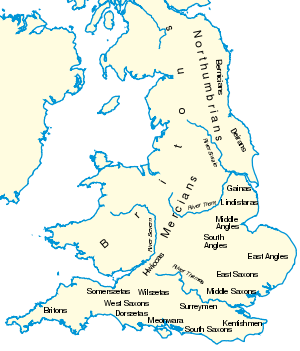Living from approximately 895 - 965 CE, Israel benefitted from the Carolingian Renascence (to distinguish it from the historical Renaissance), when Charlemagne in the 8th century sponsored scholars and promoted education. Although the Carolingian Empire collapsed in the late ninth century, King Alfred the Great invited scholars from the continent, a trend that was continued by his grandson, Æthelstan. (It is possible that Israel knew the recently discussed Æthelwold and Dunstan.)
Israel was one of those continental scholars. We know little of his early life, except that he was at Rome for a while as a student of "Ambrose" (whoever that was). He probably had a Celtic origin, because it was a 10th-century habit to give Celtic children Old Testament names.
Israel produced the Gospel book that contains the explanation (and diagram) of the board game Alea Evangelii, the "Game of The Gospels." A note in the manuscript claims:
Here begins the Gospel Dice [or Game] which Dub Innse, bishop of Bangor, brought from the English king, that is from the household of Æthelstan, King of England, drawn by a certain Franco [or Frank] and by a Roman scholar, that is Israel.
He also wrote Versus Israhelis de arte metrica super nomen et uerbum, "Verses from Israel on the metrical art of the noun and verb." This was dedicated to Bishop Rotbert of Trier. It is assumed that this was written around the time (or right after) Æthelstan's death, and Israel was looking for a new patron.
He found one. From 940 Israel was in Trier. He was the tutor of the future archbishop of Cologne, Bruno, brother of the Holy Roman Emperor Otto the Great. At a synod in Verdun in 947, Israel is referred to as "bishop." An Israel is mentioned as Bishop of Aix-en-Provence, but it is not definitively known to be "our" Israel. A bishop in Aachen between 948 and 950 debated religion with a Jew named Salomon. It is tempting to equate that bishop with Israel, since he would have been an important figure at the school in Aachen.
He was apparently a rare thing of his time and place: a man who knew Greek. Israel wrote on theology, and he produced a major teaching text when he edited the Ars Minor of Donatus and redacted everything he thought was too sensitive, an edition that could still be found in print in the 20th century. He also wrote commentary on the works of John Scottus Eriugena, and a commentary in the Isagoge of Porphyry (illustration).
Israel retired to become a monk at a Benedictine monastery in Saint-Maximin in Trier.
We know quite a bit about Archbishop Rotbert of Trier; I'll share some of it with you. See you tomorrow.














